Perspectives on the Electroacoustic Work / Perspectives sur l’œuvre électroacoustique
About this Issue / À propos de ce numéro
Editorial / Éditorial
Reflections
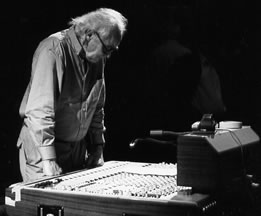
L’écriture acousmatique : Rappels et questionnements
Il est sans doute temps pour le compositeur électroacoustique de ne plus considérer l’expérimentation comme une fin en soi : il y a un temps pour remplacer les modèles anciens et un temps pour prouver, par des œuvres fortes, la pertinence d’un nouveau classicisme. La modalité acousmatique semble prête à amorcer ce processus.
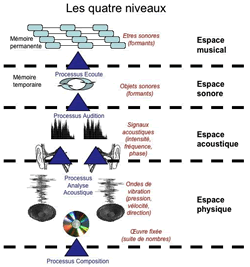
Les quatre niveaux de réception d’une œuvre électroacoustique
A la manière du modèle OSI de communication entre systèmes, le processus d’écoute électroacoustique est analysé sur plusieurs niveaux: physique, acoustique, sonore et musical. Réciproquement ce modèle propose un cadre d’étude ouvert intégrant toutes pratiques musicales actuelles.

Kontakte by Karlheinz Stockhausen in Four Channels
Stockhausen’s monumental 1960s electroacoustic composition Kontakte is better “known about” than heard. This article focuses on “hearing” Kontakte in detail and in its broader elements. While somewhat aligned with Stockhausen’s own analysis, it is presented less formally — an introduction, of sorts, and a tribute to inner vision.
Creative Influences
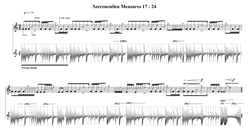
Born under a Bad Star: Analysis of abstract loop-based composition through Aaron Funk’s “Szerencsétlen”
The reception of avant-garde electronica is influenced by its origins in functional dance music, in the same way as jazz in past decades. This paper presents an analytical model that can tackle the challenges inherent in this complex genre.
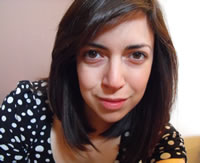
Electroacoustic Music Incorporating Latin American Influences: A consideration of implications, reception and borrowing
This paper addresses the issues surrounding the incorporation of Latin American influences into electroacoustic music. A questionnaire devised to identify sources of influence and use was answered by a selection of electroacoustic composers of Latin American origin, whose responses directed the course of this research.

Bass Drum, Saxophone & Laptop: Real-time psychedelic performance software
Bass Drum, Saxophone and Laptop is a piece of software designed for real-time performance to elicit altered states of consciousness perception. This is achieved through specific use of DSP effects and triggered sonic material, in an organic system of interactivity.
Image, Video and Visualization
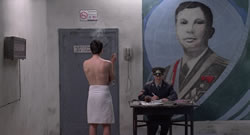
Electroacoustic Sound and Audiovisual Structure in Film
An investigation of the temporal potentials of electroacoustic sound in film, dismissing the traditional dividing line between music and sound design. The article demonstrates how sound, by maneuvering within audiovisual correspondence continua of identity, time, space and symbol, may contribute to the overall structure of a film.
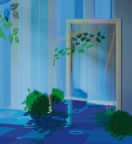
Transcrire l’écoute des musiques électroacoustiques
Lorsqu’on s’aventure dans la transcription de la reception d’œuvres musicales électroacoustiques, n’ayant par définition pas de code d’écriture fixé, le champ des possibles devient infini. L’expérience des Portraits Polychromes en ligne (GRM) conduit à s’interroger sur le phénomène musical en général.
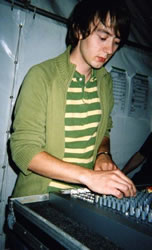
Investigating Audience Reception of Electroacoustic Audio-visual Compositions: Developing an effective methodology
This article discusses the development of a research methodology appropriate for the study of audience reception of electroacoustic audio-visual music. An examination of previous visual music definitions and the development of the term electroacoustic audio-visual music is presented also.

Sound-Initiated Drawing and Memory Impairment
The author describes the development of an interactive interface and program for creating, storing and replaying animated drawings with sound and its use with a longtime friend and artist who suffered severe memory impairment due to metastasized breast cancer.
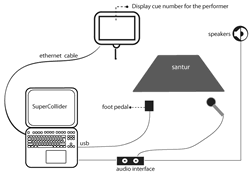
How Something is Born, Lives and Dies: A composer’s approach for thematic evolution in electroacoustic music
This article describes a compositional strategy that is applicable to tape, mixed or live electroacoustic pieces. It suggests that a particular energy-shape can be viewed as the common denominator around which complex gestures can evolve and group together forming higher-level structural blocks.
Columns
[INSTITUTIONS] Centro Mexicano para la Música y Artes Sonoras (CMMAS): The dilemma of Continuance in Mexico (Morelia, Mexico) by Rodrigo Sigal
[INSTITUTIONS] Folkwang University: Development of Electronic Music and the ICEM — Institut für Computermusik und Elektronische Medien (Essen, Germany) by Thomas Neuhaus
Reviews, Previews and New Releases
[REPORT] NIME 2010 (Sydney Australia, 15–18 June 2010) by Bob Pritchard
Social top